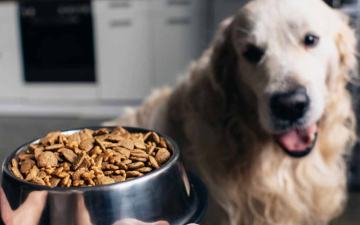How to Choose the Right Food for a Senior Pet
As pets age, their nutritional needs gradually change. A proper diet is particularly important for these older pets, as it directly impacts their health and vitality.
As pets age, their nutritional needs gradually change. A proper diet is particularly important for these older pets, as it directly impacts their health and vitality.
Nutritional Needs of Senior Pets
Nutritional Changes
As pets age, their metabolism slows, their activity levels decrease, and their energy needs decrease accordingly. Senior pets often experience a loss of muscle mass, requiring them to consume more high-quality protein to maintain muscle health. Joint problems, such as arthritis, are more common in older pets, and dietary adjustments can help reduce inflammation and support joint health. With age, pets' kidney and liver function may decline, and dietary adjustments can reduce the burden on these organs. Senior pets' sense of smell and taste may gradually deteriorate, which may affect their appetite and food choices and require special attention.

Dietary Recommendations
To cope with these changes, senior pets need to provide high-quality protein, such as chicken, fish, and turkey, to help maintain muscle mass and promote repair. Choosing low-fat foods can help reduce calorie intake and support heart health. Increased intake of omega-3 fatty acids, such as fish oil, can support joint health and reduce inflammation. Choose foods low in phosphorus and sodium to reduce the burden on the kidneys. Ensure that food is easily digestible to facilitate nutrient absorption in older pets. Increase fiber to support digestive health. Divide food into small portions and feed multiple times daily to accommodate the digestive system of older pets.
Older dogs require higher protein to compensate for protein loss.
- Older dogs may actually require slightly higher amounts of protein than younger adults. This is because the loss of muscle mass associated with aging reduces protein levels. Protein is often used by older dogs to boost immunity during times of stress and illness. Protein deficiency, especially in animal-based sources, can make older dogs particularly vulnerable.
- Studies across various dog breeds have shown that older dogs utilize protein less efficiently, meaning they need more protein. Some studies suggest that older dogs need at least 19% animal protein to maximize their protein reserves. Contrary to common nutritional misconceptions, dietary protein neither causes nor contributes to chronic kidney disease in older pets. Therefore, never limit the protein intake of healthy, elderly dogs and cats simply because they are older. It's a misconception to reduce the meat content of other senior dog foods on the market, as this means reducing animal protein, which is detrimental to the health of older dogs. Therefore, we should choose senior dog foods with a high meat content and a comprehensive amino acid profile for older dogs
Dietary Recommendations
▲ Increase Easily Digestible Foods
To maintain your dog's gastrointestinal health, it's recommended to increase the intake of easily digestible foods, such as cooked chicken and fish. These foods are not only easy to digest but also provide essential nutrients.
▲ Regularly Supplement Nutritional Pastes
As dogs age, nutrient loss becomes a significant issue. To ensure that your senior dog's nutritional needs are met, you can regularly supplement with nutritional pastes. However, be careful to use the right amount and avoid overfeeding.
▲ Moderate Fruit and Vegetable Intake
Although dogs are omnivores, they still need to consume a moderate amount of fruits and vegetables in their old age to ensure a balanced diet. When feeding, cut the food into appropriate pieces to make it easier for your senior dog to chew, as their teeth deteriorate with age.
▲ Calcium Supplementation
As dogs age, their bones become more fragile, making them more susceptible to bone problems. Therefore, owners should consider calcium supplementation to maintain bone health. Regularly provide your dog with calcium-rich foods or choose pet-specific calcium supplements.
▲ Gastrointestinal Health
As dogs age, their digestive function may gradually weaken, leading to a loss of appetite. To help older dogs maintain a healthy digestive system, probiotics can be used to improve digestion. Regular probiotic supplementation can promote digestion and absorption.


